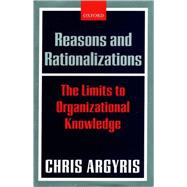
Note: Supplemental materials are not guaranteed with Rental or Used book purchases.
Purchase Benefits
What is included with this book?
| 1. Introduction | 1 | (17) | |
| 2. The Corrosion of Character: Capitalist and Socialist Economics | 18 | (16) | |
| 3. Inhibiting Double-Loop Learning in Business Organizations | 34 | (35) | |
| 4. Inhibiting Double-Loop Learning in Government and Information Technology | 69 | (23) | |
| 5. Features of Scholarly Inquiry that Inhibit Double-Loop Learning and Implementable Validity | 92 | (37) | |
| 6. Interventions that Facilitate Double-Loop Learning | 129 | (44) | |
| 7. Organizational Interventions that Facilitate Double-Loop Learning | 173 | (39) | |
| 8. Conclusion | 212 | (11) | |
| References | 223 | (10) | |
| Index | 233 |
The New copy of this book will include any supplemental materials advertised. Please check the title of the book to determine if it should include any access cards, study guides, lab manuals, CDs, etc.
The Used, Rental and eBook copies of this book are not guaranteed to include any supplemental materials. Typically, only the book itself is included. This is true even if the title states it includes any access cards, study guides, lab manuals, CDs, etc.